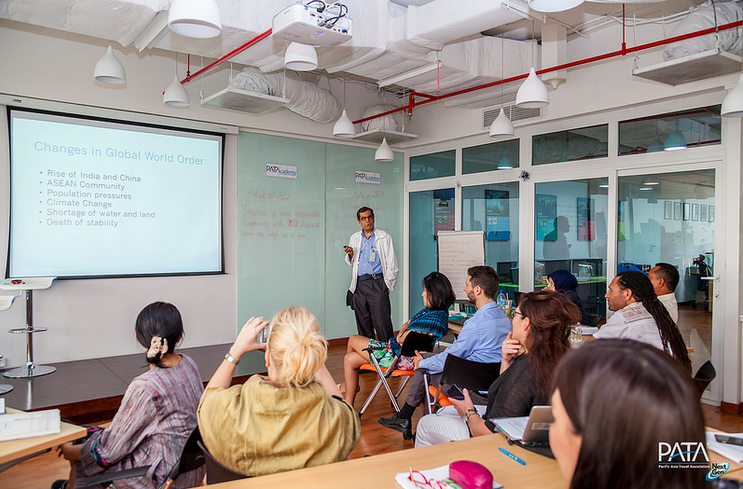
7 Dec, 2015
In global first, Newswire Editor unveils simplified format of UN Sustainable Development Goals
In a global first, Travel Impact Newswire Executive Editor Imtiaz Muqbil has crafted a simplified version of the 17-point Sustainable Development Goals to make it easier for the SDGs to be implemented by the rapidly-growing travel & tourism industry.
Two presentations given in Bangkok and Vientiane respectively on Dec 2 and 4 to explain the simplified format were both extremely well received and have set the stage for travel & tourism to seamlessly make them part of the solution across all the industry sectors.
Said Mr Muqbil, “The timing of both presentations was perfect. The Asia-Pacific region has both the world’s largest population and the world’s largest share of travel & tourism movements in terms of both inbound/outbound travellers. The combination is set to place a huge strain on the region’s finite resources, especially water.
“In an era of Problems Without Passports, it is imperative for travel & tourism to ensure that it does not become a victim of its own success in the upcoming Asian Century. The SDGs offer a set of very clearly defined goals to help travel & tourism better manage the projected growth,” he said.
|
The first presentation was on Dec 2 at the PATAcademy, a three-day Human Capital Development workshop under the theme ‘Designing Our Future: The Grass Is Always Greener Wherever We Stand’. Organised by the Pacific Asia Travel Association at its Bangkok HQ, it was attended by delegates from Papua New Guinea, Timor Leste, Indonesia, Hong Kong and Thailand.
 Imtiaz Muqbil delivering his presentation at the PATAcademy. |
After the Academy, PATA CEO Mario Hardy emailed Mr Muqbil: “Thanks for having joined us today for your inspiring thoughts. Because of you I have now memorised the 17 goals! It’s now anchored in my memory.”
The presentation was avidly discussed by the participants during the subsequent workshops as part of assignments to explore practical implementation of the SDG agenda.
Photographs of the highly successful workshop can be found here: https://www.flickr.com/photos/100194629@N07/albums/72157661863239216
The second presentation was on Dec 4 at the Vientiane-based Lao National Institute for Tourism and Hospitality (LANITH) which is funded by the Luxembourg development agency. Chief Technical Advisor Peter Semone, who also chairs the PATA Foundation, invited Mr Muqbil to give the talk as part of a biannual travel symposium event. It was attended by representatives of numerous aid agencies operating in Laos, hotels, tour operators and NGOs.
One participant from Accor Hotels called it a very inspiring presentation. Another delegate told Mr Semone that it was the best presentation she had ever heard at any of the Lanith symposiums. Mr Semone emailed Mr Muqbil: “Thanks for your excellent efforts for the 17th Lanith Symposium Keynote Presentation, which was very well received.”
In his presentation, Mr Muqbil argued that Laos, classified by the UN as one of the world’s poorest countries, had a unique opportunity to become the first country to commit to a strong link between T&T and the SDGs.
“Laos enjoys what I call the ‘last mover advantage’,” Mr Muqbil said. “Being far less advanced economically than its other ASEAN neighbours is in fact a major advantage. The country has a unique opportunity to learn from their mistakes and develop in a more balanced manner.”
In both presentations, Mr Muqbil stressed the importance of the link between spirituality and sustainability, highlighting the role of water in the the major faiths of the Asia-Pacif, and in shaping the region’s culture and heritage.
He stressed that unless global arms expenditures could be curbed and the trillions of wasted dollars diverted from the merchants of death to the industry of peace, the SDGs would never be fully achieved.
Approved by the United Nations at a special leadership summit in September 2015, the 17-point SDGs are are a sequel to the former eight-point Millennium Development Goals. Both are designed to alleviate poverty as an over-arching goal but also address other global problems such as health, education, environment, gender equality, etc.
The official wording of the SDGs, however, is full of jargon and UN-speak in much the same way as the MDGs, as a result of which the MDGs were almost entirely ignored by travel & tourism during their 15-year tenure.
Mr Muqbil said that his years of experience in covering meetings of the UN regional headquarters in Bangkok was instrumental in developing the simplified version. “UN meetings bring together some brilliant minds. However, many of the very potent and powerful messages get lost in translation when being communicated to the general public.”
Mr Muqbil has also been commissioned by the UN World Tourism Organisation to research and compile the first UNWTO-PATA reports to better connect the global travel & tourism industry to the SDGs. The first two editions are available by clicking here: http://asiapacific.unwto.org/content/unwto-pata-tourism-updates-0
For those who use the simplified format of the SDGs in their own reports, presentations and studies, please give appropriate credit. Mr Muqbil is available to speak and answer questions on this unique initiative at other industry forums and events. Email: imtiaz@travel-impact-newswire.com



Liked this article? Share it!